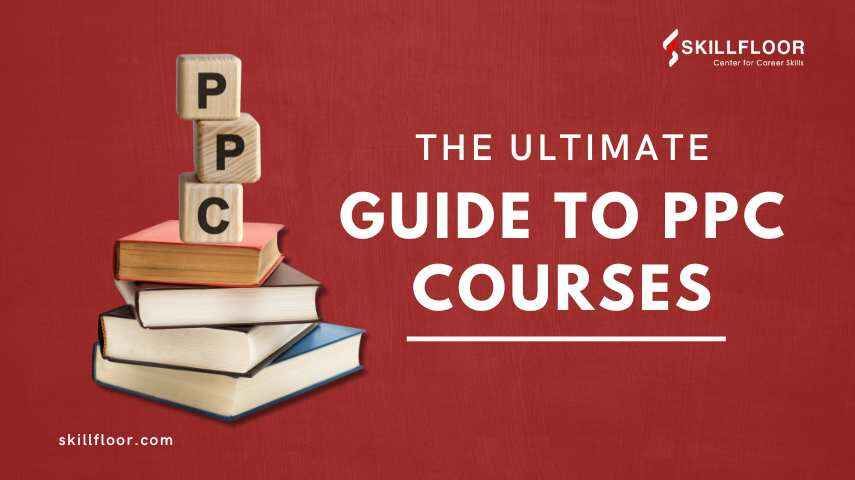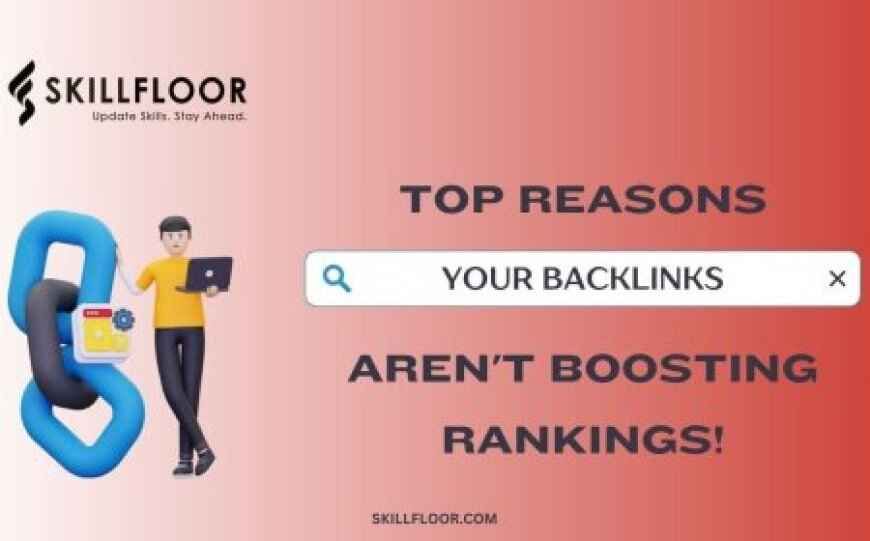Complete Guide to Pay-Per-Click Courses
The ultimate guide to Pay-Per-Click (PPC) courses. Learn about top courses, benefits, and how they can boost your digital marketing skills effectively.

In my early days as a digital marketer, I mostly depended on organic traffic to build my online profile and help businesses achieve their goals. My go-to strategies were social media, content marketing, and SEO. But as the digital field grew more competitive, it became clear that depending just on organic strategies wasn't enough. When companies asked for results right away, I started researching pay-per-click (PPC) advertising. I had never worked with PPC before, so it was exciting and confusing for me. After all, I wasn't going to be managing a budget that could go up in my head with a few wrong clicks.
I decided to enrol in my first digital marketing courses in skillfloor to make the most of this new advertising strategy. I obtained a foundation from the course, which covered everything from tracking performance to managing bids and keyword understanding. PPC is now an essential tool in my digital marketing toolbox, enabling me to offer clients fast, measurable outcomes. Let's go over a thorough explanation of pay-per-click courses, along with the reasons they're a great investment for anyone looking to be successful in digital marketing.
Introduction to Pay-Per-Click Advertising
Pay-per-click (PPC) advertising is a popular online marketing strategy that helps businesses interact with potential customers. Consider that you are the owner of a small online business that sells handcrafted jewellery. You make a PPC advertisement on Google to draw in more visitors. When someone searches for "handmade necklaces," the top result of the search is your advertisement. You will be charged a small fee if someone clicks on your advertisement, but the potential customer is now on your website and may decide to buy.
Gaining experience in the creation and management of PPC ads can be valuable. The basic principles of PPC are addressed in a variety of online courses, which cover everything from ad setup to performance analysis and campaign optimization for improved results. Beginners or small business owners who wish to learn how to effectively sell their products should take these courses. With the correct information, you can make the most of your advertising budget and increase website traffic, which will eventually increase sales and grow your business.
What Is Pay-Per-Click (PPC) Advertising?
Before getting into the details of Pay-Per-Click courses, let's discuss PPC advertising and talk about its importance in today's digital world.
PPC is an online advertising model in which marketers pay a fee each time a user clicks on their advertisement. With pay-per-click (PPC) advertising, you only have to pay when a user clicks on your advertisement as compared to traditional advertising, when businesses pay for a spot regardless of engagement. Google Ads is the most widely used PPC advertising platform, but there are others as well, including Bing Ads, Facebook Ads, LinkedIn Ads, and Twitter Ads.
PPC gives businesses a way to easily and directly reach the people they want to reach. PPC advertising allows businesses to enhance traffic, boost revenues, and achieve a high return on investment (ROI) by selecting the appropriate keywords, focusing on particular demographics, and establishing highly optimized campaigns.
Why Should You Take a Pay-Per-Click Course?
PPC advertising looks easy enough to bid for clicks and receive traffic but in practice, it involves much more intricate work. Deep knowledge of several topics is necessary for successful PPC campaigns, including budget management, audience behaviour, bidding strategies, keywords, and ad copy. I realized very quickly when I started in PPC that errors may become quite expensive, very fast.
With the help of pay-per-click courses, you may master the specifics of social media advertising, display ads, sponsored search, and more through an organized learning path. These courses cover all you need to know to design, manage, and optimize PPC campaigns that yield quantifiable results, from basic concepts to advanced strategies.
Here are some key reasons why enrolling in a Pay-Per-Click course is worthwhile:
-
Learn from Experts: A great deal of Pay-Per-Click courses are given by experienced digital marketers with many years of managing successful PPC campaigns. Their advice may help you prevent common mistakes and implement best practices.
-
Structured Learning: While blogs and online tutorials can be useful, they sometimes lack depth and structure. Pay-per-click courses provide an organized approach to learning, covering everything from account setup basics to the complexity of performance analysis.
-
Resources and Tools: The majority of PPC courses give you access to learning resources, templates, and tools that you can use immediately for your campaigns.
-
Keep Up with Trends: PPC is a constantly evolving field. Targeting decisions get more effective, new bidding strategies are provided, and search algorithms change. Taking a quality Pay-Per-Click course can help you stay current on PPC advertising trends.
-
Credibility and Certification: Upon completion of multiple PPC courses, certification is provided. One popular certification that might increase your credibility as a marketer is the Google Ads certification.
Now, you may ask a question where should I join for a Pay-Per-Click (PPC) course? That might be the question on your mind as you look to learn PPC and build a career in digital marketing. You can find Skillfloor as an institution with outstanding ratings and an experienced mentor who walks students through the entire process, after looking into several options. The instructor's practical knowledge will help with learning both basic and complex PPC strategies. Building trust requires practical experience and well-defined examples. Following the instructions, Skillfloor may help with career placement, bringing you in contact with a digital marketing Institute to start your career.
What to Expect from a Pay-Per-Click Course
Enrolling in a Pay-Per-Click course should be expected as a thorough exploration of several PPC advertising fields. Regardless of the platform you choose, a great deal of courses seek to provide you with the practical skills you need to manage campaigns successfully. An overview of the typical syllabus for a Pay-Per-Click course may be seen below:

1. Research and Selection of Keywords
Researching keywords is one of the most important components of any PPC campaign. You'll learn which keywords your target market uses and how to use resources like SEMrush and Google's Keyword Planner to figure out which keywords will work best for your campaign.
2. Campaign Setup
You may learn how to create campaigns on a variety of platforms, including Google Ads, Facebook Ads, and Bing Ads, by taking courses. This includes creating ad groups, choosing the best bidding strategies, focusing on specific audiences, and knowing the differences between search, display, and social media ads.
3. Techniques for Bidding
PPC bidding is more about strategy than it is about who can spend the most money. Many bidding strategies, including cost-per-click (CPC), cost-per-thousand-impressions (CPM), and cost-per-acquisition (CPA), are usually covered in courses. To get the most out of your advertising budget, you'll learn how to optimize bids.
4. Creating Ad Copy
Your ad's copy plays an important part in influencing users to click on it. You can learn how to create attractive and successful ads that compel clicks by enrolling in a PPC course. Courses often provide advice on creating headlines, descriptions, and calls to action that matches your brand and campaign objectives.
5. Creating Landing Pages and Optimizing
When someone clicks on your advertisement, a landing page loads. To make sure you're converting clicks into leads, landing page design and optimization are often highlighted in courses. This covers advice on optimizing conversion rate (CRO), ensuring mobile compatibility, and providing a perfect user experience.
6. Performance Tracking and Analytics
You must evaluate the performance of your campaigns if you want to make changes. You can learn how to monitor important metrics like click-through rate (CTR), conversion rates, cost-per-click (CPC), and quality score by enrolling in pay-per-click courses. Additionally, you'll learn how to assess your performance and plan out future campaigns using data-driven strategies using programs like Ads Manager and Google Analytics.
7. Advanced Strategies
You'll learn about audience segmentation, split testing (A/B testing), remarketing, and automated bidding tactics in advanced Pay-Per-Click courses. How to combine PPC with other digital marketing efforts like SEO, social media, and email marketing will also be covered in advanced courses.
Different Types of Pay-Per-Click Courses
There are several Pay-Per-Click courses offered that fit different skill levels and areas of interest. The most common types of PPC courses are broken out as follows:
1. Beginner Courses
Beginner-level PPC courses are ideal for individuals who are just getting started because they concentrate on fundamental ideas like account setup, keyword research, and understanding important performance measures. The goal of these courses is to give students a basic understanding of how PPC functions on various platforms.
2. Intermediate Courses
Those who wish to improve their strategies and have some experience managing PPC ads should enrol in intermediate courses. These courses concentrate on challenging topics including advanced keyword research, audience segmentation, and optimization strategies.
3. Advanced Courses
Experienced marketers who want to improve their PPC strategies can enrol in advanced PPC courses. Complete parts on automation, machine learning in PPC, and advanced remarketing strategies are frequently included in these courses. They might also go deeply into particular to a specific given platform that only qualified marketers should be aware of.
4. Platform-Specific Courses
-
Google Ads: Detailed training on using Google Ads for search and display advertising.
-
Facebook Ads: Focuses on PPC advertising through Facebook, Instagram, and its broader social network.
-
Bing Ads: Specialized in advertising through Microsoft Bing.
5. Bootcamps and Workshops
Workshops and boot camps provide a concentrated, frequently brief, learning atmosphere. These classes usually focus on practical learning and may include real-world projects where you may put your newly acquired knowledge to use right away.
How to Choose the Right Pay-Per-Click Course
Choosing the best Pay-Per-Click course can be overwhelming with the many options available. The following are some things to think about when choosing:
1. Instructor Expertise
Verify if the instructor for the course is an experienced expert with a successful track record in PPC advertising. You will gain more practical insights from a course given by someone who has effectively managed campaigns and worked with a variety of clients than from a theoretical one.
2. Reputation and Reviews
Look for courses that have received great feedback and recommendations from previous students. Look for reviews on websites such as Udemy, Coursera, or LinkedIn to learn about the instructor, the content, and the overall learning experience.
3. Certification
After completing certain Pay-Per-Click courses, students can earn certificates like the Facebook Blueprint Certification or the Google Ads Certification. These certifications can improve your resume and are accepted in the field of digital marketing.
4. Course Content
Verify that the course covers the subjects that most interest you. A course covering the basics of PPC is what you should take if you're a beginner; more experienced marketers may want to look for courses on certain tools or methods.
5. Learning Format
Think about the methods you learn best: written instructions, video lessons, or practical tasks. While some courses involve live sessions or interactive homework, others are self-paced. Select a format based on your schedule and learning preferences.
6. Price
PPC courses come in a wide range of prices. While some can cost hundreds or even thousands of dollars, others are free. It's important to consider both the course's cost and the value it will provide. Great information can be found in many free or inexpensive courses, but more expensive ones may offer networking opportunities, more in-depth learning, or specific feedback.
Popular Pay-Per-Click Courses Certification You Should Consider
Getting certified can provide you with an advantage if your goal is to advance in your PPC or digital marketing job. You should think about obtaining the following popular Pay-Per-Click (PPC) course certifications:
This certification, provided by Google, covers every part of Google Ads, including search, display, sales, and video ads. Employers put a high value on it, and it's great for anyone who takes PPC seriously.
-
Microsoft Advertising Certification
Microsoft offers a free certification that focuses on Bing Ads. If you want to learn more about something other than Google Ads, this is a fantastic alternative.
-
Facebook Certification of the Blueprint
This certification, offered by Meta, teaches you how to manage Facebook and Instagram ads. For people who wish to focus on social media advertising, it's perfect.
-
HubSpot PPC Certification
Beginners can benefit greatly from HubSpot's PPC course, which covers the basics of social media and search advertising.
-
Semrush PPC Fundamentals Certification
Semrush provides a free certification that teaches you about campaign optimization, keyword research, and result tracking.
Career Opportunity in PPC If You Choose Pay-Per-Click Courses
Here’s a table outlining six key career opportunities in PPC after taking Pay-Per-Click courses:
|
Career Role |
Description |
Skills Gained from PPC Courses |
Salary Range (Approx.) |
|
PPC Specialist |
Manages and optimizes PPC campaigns on platforms like Google Ads and Facebook. |
Keyword research, campaign management, ad copywriting, performance analysis. |
₹3,50,000 - ₹5,00,000 per year |
|
Digital Marketing Manager |
Oversees all digital marketing strategies, including PPC, SEO, and social media marketing. |
Advanced PPC strategies, team management, campaign optimization, budgeting. |
₹6,00,000 - ₹12,00,000 per year |
|
PPC Account Manager |
Works directly with clients to develop and manage their PPC advertising strategies. |
Client communication, campaign planning, performance tracking, report generation. |
₹4,50,000 - ₹7,00,000 per year |
|
Paid Search Manager |
Focuses on managing and optimizing paid search campaigns to drive traffic and conversions. |
Search ad creation, bid management, landing page optimization, data analysis. |
₹5,00,000 - ₹8,00,000 per year |
|
E-commerce PPC Manager |
Manages PPC campaigns specifically for online stores to boost product sales through Google Shopping and PLAs. |
E-commerce platforms, product listing ads (PLAs), shopping campaigns, remarketing techniques. |
₹4,50,000 - ₹7,00,000 per year |
|
Freelance PPC Specialist |
Works independently to manage PPC campaigns for multiple clients, offering flexibility in work. |
Ad creation, campaign management, client relationship management, reporting. |
₹4,00,000 - ₹10,00,000+ per year (depends on clients) |
These six roles highlight the variety of career paths you can pursue in PPC, with a strong emphasis on campaign management, strategy, and optimization.
Taking a Pay-Per-Click course is one of the best techniques for learning the skills needed to manage successful PPC campaigns. PPC advertising provides a quick and measurable means for achieving your goals, whether you're trying to raise online sales, develop brand awareness, or enhance website traffic. You can study the ins and outs of PPC as well as get the confidence to manage campaigns and make data-driven decisions by enrolling in a structured course.
It's essential to remain ahead of trends in the constantly changing field of digital marketing. The pay-per-click course is an effective approach to make sure your campaigns are effective and that your skills are updated.






























































